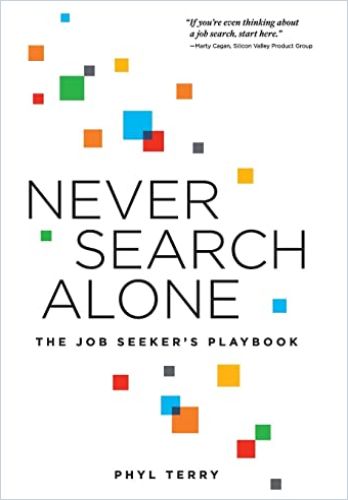Phyl Terry offers a systematic approach to building job-hunting support, gaining crucial feedback and finding the job you really want.

Find Your Job
Searching for a job can be daunting, emotionally draining and possibly unpleasant – especially if you do it alone. Phyl Terry – founder and CEO of Collaborative Gain – believes asking for help enables you to handle job transitions more adeptly. He urges you to seek guidance from your mentors and to establish mutual support arrangements with other job seekers via a “Job Search Council.” Terry’s concise, insightful guide explains how to ask for help, define your career goals, locate the right job and negotiate for success.
“Job Search Council”
Terry notes studies showing that asking people for help makes them feel important and honored. Be clear that you seek assistance as an informed colleague, not as a dependent who expects somebody to do your work for you.
…85% of executives who make it to senior management say not only that they asked for help, but they credit it and their community of support with playing a key role in getting promoted into or staying within the senior ranks.Phyl Terry
Create a strong support group – your “Job Search Council.” Your Job Search Council can help you handle the emotional weight of job searching. Its role is based on cognitive empathy. Search for Job Search Council members among people you know. Professional peers also seeking jobs will be worthy candidates. Create a public LinkedIn post to include your online community.
Establish the job seekers you want in your council, Terry writes. Do you want unemployed people trying to find work quickly or people who have a job and can take time transitioning to a new one? These two groups have different timetables – unemployed people have more time available for job hunting than people with jobs.
Set up a meeting with at least one potential council member – in person or on the phone – and share your goals. Explain that you want to form a mutual-support group to grow and learn together.
Each council member should find another person to recruit, for a total of at least four people. Your council will provide a secret power almost all CEOs have depended upon during their careers: leadership development through peer support.
Draft a two-page document stating what you love doing, what you need from a job, your “must haves,” “must nots,” what you don’t want to do and what career goals you hope to fulfill. Let feedback from your Job Search Council inform your list.
Write down your long-term goals – becoming a CEO, for example – and your short-term goals – such as a clear path for professional growth and upward mobility. Refine your document with insight from your council and other experts.
Terry also suggests conducting a “Listening Tour” to learn about your perceived strengths and weaknesses as a job candidate. Reach out to between three and five of your previous bosses and co-workers who know your work ethic and personality. Meet with them to ask what you did well and what you could have done better.
Ask your network the “Golden Question”: “If you were in my shoes, how would you approach this job search?” Provide context about your career goals and what you want out of a job. Share your two-page document.
“Candidate-Market-Fit”
Recognize how your skills fit the market. If what you want isn’t available, Terry suggests creating a multi-step strategy that might not lead immediately to your ideal job, but will ultimately get you there.
Express your plan in a clear, short statement that aligns your goals with the reality of your current marketability, such as, “Find a chief of staff role in a medium-sized company.” Update your LinkedIn profile to include this statement. Focus on your “about” section and list of skills in management and executive functions. Recruiters use filters to search for key phrases, so if you want a marketing job, use the word, “marketing.”
A goal, hope or aspiration is not a strategy. Strategy is how you achieve the goal, hope or aspiration.Phyl Terry
Calculate your “Candidate-Market-Fit,” which is the intersection of your desires and the market. Craft a sentence such as, “Look for a small health care consulting firm with a great culture,” and point your job search efforts toward that goal.
Networking and Interviewing
Most of the good jobs available do not appear online; you can access them only through a strong network. Creating a Job Search Council, writing your two-page document, and reaching out to previous bosses and colleagues will streamline your networking process, Terry writes.
Contact the people you spoke with during your market research. Email asking for another meeting and providing your updated goals. Thank them for their help, ask about your current market position – your Candidate-Market-Fit – and what they would do in your position. Inquire about further networking opportunities or groups that might be beneficial to your search. Ask about companies you should focus on and contact those firms immediately. Let people who helped you know about your results.
During an interview, ask about the company. Discover whether a particular job is a good fit for you, not only if you’re a good fit for it, Terry advises. Ask if this is a new position; if not, ask why the previous person left. Ask who you’ll report to and what success would look like.
Remember, the best treatment you will ever get from this company is during the interview. Phyl Terry
When you receive a job offer, don’t accept it right away. Consult your council to assess where this job offer sits on your scale of the best to the worst opportunities.
Most people do not get the salary or company resources they need because they don’t ask. Most companies start with lower offers because they expect prospective hires to negotiate.
Terry suggests that you consider everything you will need from the company to reach your goals. Entering a negotiation with prepared requests shows that you are serious about the company’s objectives. Some 83% of the time, if you request what you need, you will receive it. Ask about budget, staff, technology, and professional support for building fresh systems or teams, or to find additional funding.
Review
Phyl Terry offers an unusual approach to searching for work: His primary stance is that no one likes job hunting, and no one should suffer through the experience alone. Though he hits some familiar notes – such as remembering to ask for what you want and researching companies carefully – he moves into new, worthy territory with his guidance for building a community of fellow job seekers. Terry writes in a refreshing, upbeat voice that conveys his optimism regarding this approach. His manual of exercises, resources and helpful hints should help you move forward toward the job you most want.





